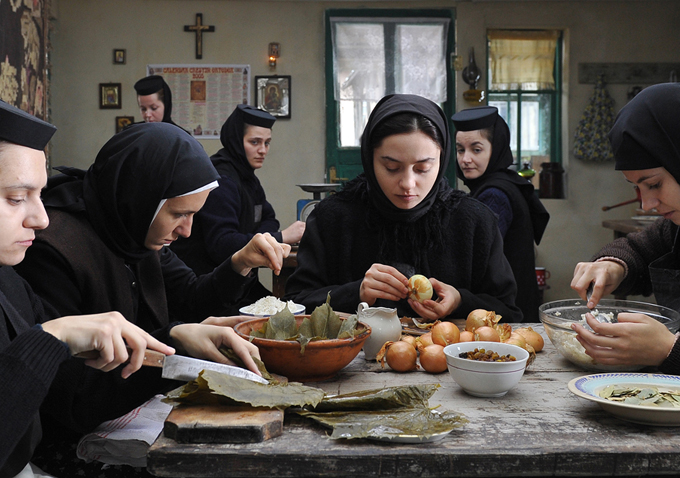 Can blind, unquestioning devout faith be just as corrupting as sin? Can love be as all consuming as evil? These are the big, broad themes being explored in Cristian Mungiu‘s deliberate and somewhat cryptic “Beyond The Hills,” a very slow burn drama that finds both religious and emotional obsession crossing paths with tragic and haunting results.
Can blind, unquestioning devout faith be just as corrupting as sin? Can love be as all consuming as evil? These are the big, broad themes being explored in Cristian Mungiu‘s deliberate and somewhat cryptic “Beyond The Hills,” a very slow burn drama that finds both religious and emotional obsession crossing paths with tragic and haunting results.
Set in an orthodox monastery in rural Romania, the film opens with Voichita (Cosmina Stratan) meeting her friend Alina (Cristina Flutur) at the train station, where the latter dissolves into a torrent of tears after they embrace. It has been a few years since they’ve seen each other at the orphanage where they were both raised, and after a stint working abroad in Germany, Alina has returned to reunite with Voichita so that they can start a new life together. But Voichita has found a new purpose as a nun at a monastery and is reluctant to leave to go into a life that is unknown. As she has nowhere else to go, Voichita gets the Father of the monastery to agree to take Alina in for the time being, but it’s just the beginning of a battle of wills and heart in which no one comes out a winner.

Though it’s never quite said explicitly, it becomes clear (via a topless massage) that before Alina arrived at the monastery, her relationship with Voichita was more than just a close friendship. But now that she has found God, she’s glad to see her friend, but has put her faith before all else. Alina can’t quite understand the hold that the rustic (no electricity or plumbing) monastery and God have for Voichita. Her moods begin to swing wildly, she accuses Alina of sleeping with the priest and eventually she suffers a fit and is rushed to hospital. She says she hears a voice sometimes, and her behavior is unpredictable, but is this just a ruse to get Alina’s attention? Is this the result of a broken heart? Or, as the priest and nuns are beginning to believe, has she been taken over by evil spirits? Alina’s subsequent fits and incidents seem to point the latter…but there is enough ambiguity that Mungiu leaves it up for debate.
What eventually emerges is a tricky drama that veers from Alina’s efforts to leave with Voichita and transitions to her increasing amount of fits and Alina’s struggle to maintain her faith despite the temptation of a secular life. And it’s in this push-and-pull, between faith, love, God and the devil that the film may lose some viewers. Mungiu has clearly stated in the press notes that the film is about mistakes that have been made in the name of faith, but he leaves plenty of blame to pass around. Both Alina and the priest find that their commitment to God gets in the way of understanding or compassion. Indeed, all of their actions and speeches are done in the context of religious speak, and at one point Alina asks Voichita why she can’t talk normally, like she used to do.

Mungiu also takes a risk (and pulls it off) by moving into exorcism territory in the second half of the film, as the community believes that Alina’s repeated fits and outbursts are the cause of the devil. Intriguingly, the priest is hoping to get officially consecrated and he too finds himself tested, having to decide whether to do the right thing and try and help Alina spiritually, or to kick her and Voichita out to make his life easier and keep the focus on moving his humble place of worship up the food chain. It’s a detail in the background that never comes into the main thrust of the story, but even with the motivation lingering in the air, it casts his actions in a different light altogether…who is he really trying to help? Himself and his dreams of being recognized in a larger religious sphere? Or is he trying to save a young girl from the clutches of Satan? Perhaps both…
Truthfully, you’ll never really know, and the seemingly random and open ending may throw many off, and perhaps play as Mungiu stiffing the audience. And while it’s certainly not spelled out to any specific degree, a slight wardrobe change in one of the characters indicates that some kind of subtle shift has taken place, as hard earned as it is. And as the snow falls and dirty slush fills the screen in the final, mesmerizing shot of the movie, Mungiu acknowledges, in a nice sly addition, that the world outside the monastery has its own part to play in allowing the zeal of religion to overtake human compassion.
Gorgeously lensed and executed with an exacting (some would argue dry) aesthetic in which there are minimal camera movements and long takes, “Beyond The Hills,” running at two and a half hours, is an endurance test. But pace yourself and lean back, because the rewards are ample. Deceivingly complex, with an emotional center that peels away like an onion the longer it unfolds, this is a powerful effort from Mungiu in which love and faith are both different kinds of poison. [B+]

